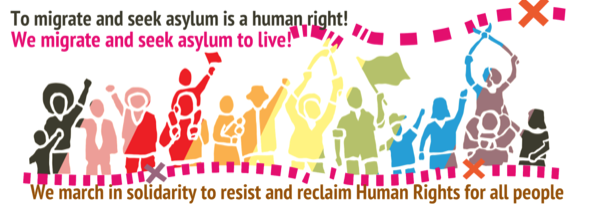14 September 2020
Source: Transnational Migrant Platform – Europe
Communique from the Working Group mobilisation on 45th Session of the PPT
MORIA burns, again. This documented horror in the heart of Europe, has been denounced from its beginning (2015) by dozens of reports from human rights, humanitarian and other non-governmental organisations. Almost 20,000 (at peak last February) and at the time of the fire, 13,000 human beings were parked in a prison of mud, rubbish and violence, behind barbed wire. MORIA is a planned limbo, where refugees are being denied their right to asylum, freedom and dignity, unable to perform even the most basic daily activities, such as sleeping, eating or communicating. It was a place where health care and education were denied to 4,000 children – left without dreams; adolescents whom the abnormal rates of suicide attempts should have been an alert of the level of despair in the camp (MSF); women terrorized by daily rapes, lack of hygiene and rampant violence. Hundreds of testimonies revealing the levels of unbearable “non-life” in MORIA, were kept unheard for years.
Now the fenced camp, which was about to be closed, has burned to the ground. But how could this construction – the abandonment of human beings reduced to “numbers and bodies” – re-emerge as an island-lager in the heart of 20th Century Europe? How has this apartheid andsuffering as planned management of the “other”, of the “migrant” been accepted and tolerated in the long silence of 5 years? This inhumane “containment” had been erected as a model for migration policies by the European Commission and the EU Member States. MORIA has been the essence of the deterrence model aimed at discouraging the flight of potential asylum seekers from countries at war and to push them back to the ruins, sealed by the EU-Turkey agreement in 2016. It is documented that on Greek islands, the Geneva Convention was being constantly violated on a daily basis. Has it been buried in Lesbos?
The most disturbing reality of all is that MORIA is not exceptional – but part of a chain of Camps and Hotspots across Europe constructed as sites “without rights” and a systematic planned annihilation of the “other”, psychically destroyed in camps, where they could have even burned alive. The EU borders, as well as the maritime routes have also become sites of death where thousands have drowned. This situation is indicative of the overall policy of necropolitics practiced by the European Union and its member states towards migrant and refugee peoples and is combined with the policy of militarised externalisation of borders. And inside the Fortress Europe – as is graphically shown in this time of COVID-19 – the migrant workers who make up a big part of the “essential workers’ in agriculture, care and domestic work – are also denied fundamental rights, subjected to daily racism and deprived of the conditions to live a decent human life.
As part of that Europe that still recognizes itself first of all as “human”, and joining all the movements that in these hours are making their voice heard, we, the signatories, who have been witnessing for years the tragic fate of the migrant and refugee peoples, denounce even more the fire of MORIA as a symbolic and highly visible expression of the silent, permanent, planned crime against humanity for which the European Commission the European States are responsible, as highlighted by the Permanent People’s Tribunal sentence (Hearings 2017-2019). The humanitarian interventions of these hours – already minimal in itself – can only appear as a saving face operation. Once again these pronouncements refer to a time without deadlines, and therefore confirm the existing genocidal policy – as the European Commission, and the EU governments, opt for an identity that declares itself exempt from the obligations of the civilization of law. These obligations were meant to be consistent with the ‘never again’ commitment against the extermination camps and had made Europe a place of welcome and an indicator of its own development project.
We therefore call on the EC and all the European States:
- To urgently evacuate the island and re-locate to safety and dignity the MORIA migrant and refugee peoples.
- To end the criminalisation of migrants and refugees and the criminalisation of solidarity.
It is Not a Crime to Migrate or to seek Asylum! It is a Human Right!

